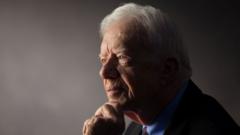In 2024, the echoes of Jimmy Carter's presidency resonate through the challenges America faces today, reminding us that despite the passage of time, many adversities remain insurmountable. Carter's tenure, marked by a crisis of confidence among the American public amid economic and foreign policy struggles, is reflected in Biden's current administration as he navigates ongoing global conflicts and domestic frustrations.
Like Carter, who brokered the Camp David Accords yet could not resolve deeper issues in the Middle East, Biden too faces renewed challenges as humanitarian crises unfold in Gaza and regional tensions flare up. Both administrations grappled with the limits of U.S. influence, particularly in Iran and Afghanistan; Carter's inability to manage the fallout of the Iranian hostage crisis is mirrored in Biden's chaotic withdrawal from Afghanistan, an event that shaped international perception of American power.
Carter’s legacy includes lessons on diplomacy and international relations, such as the normalization of ties with China, which today presents a competitive dynamic for Biden as he navigates a tense relationship with the rising power. On domestic fronts, both presidents contend with economic strife: Biden's recent struggles with inflation echo Carter's experiences during the oil crisis, despite the overall economic context showing growth.
Public trust in government has been a persistent issue since Carter's presidency; he famously termed it a "crisis of confidence" in 1979. Comparatively, Biden has not escaped this troubling trend, which has only worsened recently with political polarization and heightened dissatisfaction among citizens.
Carter’s post-presidency years have distinguished him as a beacon of humanitarian efforts and humanitarianism, while the current political landscape sees Biden facing the lingering fallout of his predecessor Trump’s polarizing influence. Observers note the contrasts between their leadership styles; while Carter embraced a humble approach, Trump reveled in the grandiosity of power, shaping the narrative around their respective administrations.
As America reflects on the legacy of Jimmy Carter, it becomes pivotal to recognize how history continues to inform the present, suggesting that the issues defined by geopolitical tensions, economic dilemmas, and public distrust are crucial reminders of the enduring challenges that shape American identity and global standing.
Like Carter, who brokered the Camp David Accords yet could not resolve deeper issues in the Middle East, Biden too faces renewed challenges as humanitarian crises unfold in Gaza and regional tensions flare up. Both administrations grappled with the limits of U.S. influence, particularly in Iran and Afghanistan; Carter's inability to manage the fallout of the Iranian hostage crisis is mirrored in Biden's chaotic withdrawal from Afghanistan, an event that shaped international perception of American power.
Carter’s legacy includes lessons on diplomacy and international relations, such as the normalization of ties with China, which today presents a competitive dynamic for Biden as he navigates a tense relationship with the rising power. On domestic fronts, both presidents contend with economic strife: Biden's recent struggles with inflation echo Carter's experiences during the oil crisis, despite the overall economic context showing growth.
Public trust in government has been a persistent issue since Carter's presidency; he famously termed it a "crisis of confidence" in 1979. Comparatively, Biden has not escaped this troubling trend, which has only worsened recently with political polarization and heightened dissatisfaction among citizens.
Carter’s post-presidency years have distinguished him as a beacon of humanitarian efforts and humanitarianism, while the current political landscape sees Biden facing the lingering fallout of his predecessor Trump’s polarizing influence. Observers note the contrasts between their leadership styles; while Carter embraced a humble approach, Trump reveled in the grandiosity of power, shaping the narrative around their respective administrations.
As America reflects on the legacy of Jimmy Carter, it becomes pivotal to recognize how history continues to inform the present, suggesting that the issues defined by geopolitical tensions, economic dilemmas, and public distrust are crucial reminders of the enduring challenges that shape American identity and global standing.

















